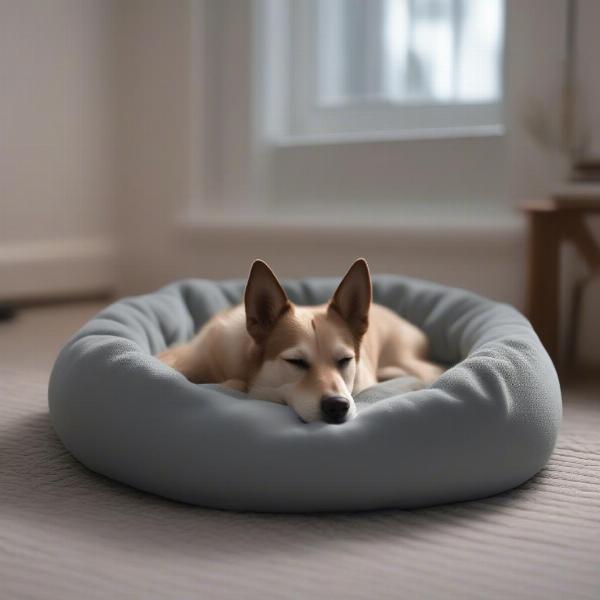If your furry friend is tossing and turning more than you are, you’re not alone. Many dog owners find themselves asking, “Why is my dog restless at night?” A restless dog can disrupt your sleep and be a sign of an underlying issue. This article will explore the common causes of nighttime restlessness in dogs and offer practical solutions to help both you and your canine companion get a good night’s sleep.
Understanding Why Your Dog Can’t Settle at Night
Several factors can contribute to a dog’s nighttime restlessness. These range from simple discomforts like an unsuitable sleeping area to more complex medical conditions. Identifying the root cause is crucial for finding the right solution. Is it a full bladder? Are they too hot or cold? Or could it be something more serious? Let’s delve deeper.
Physical Discomfort: The Basics
Sometimes, the simplest explanations are the most accurate. An uncomfortable bed, extreme temperatures, or even a full bladder can keep your dog awake. Consider the following:
- Bed Quality: Is your dog’s bed supportive enough? Older dogs, especially, benefit from orthopedic beds that cushion their joints.
- Temperature: Dogs can get too hot or too cold, just like us. Ensure their sleeping area is temperature-regulated.
- Potty Breaks: A final potty break before bedtime can prevent nighttime wake-ups and restlessness.
Medical Reasons for Restlessness
While discomfort is a common culprit, underlying medical conditions can also manifest as nighttime restlessness. These include:
- Arthritis or Joint Pain: This is particularly prevalent in older dogs and can make it difficult for them to get comfortable.
- Cognitive Dysfunction Syndrome (CDS): Similar to dementia in humans, CDS can cause confusion and anxiety, especially at night.
- Allergies or Skin Irritations: Itching and discomfort can make it impossible for your dog to relax.
Behavioral Factors Affecting Sleep
Beyond physical and medical reasons, behavioral factors play a significant role in canine sleep patterns.
- Separation Anxiety: Dogs who experience separation anxiety may become restless and anxious when left alone at night.
- Boredom or Lack of Exercise: A tired dog is a well-behaved dog. Insufficient physical and mental stimulation during the day can lead to restlessness at night.
- New Environments or Routines: Changes in routine or surroundings can disrupt a dog’s sleep.
Practical Solutions for a Restless Dog
Now that we’ve explored the potential causes, let’s discuss some solutions.
Creating a Comfortable Sleeping Environment
- Invest in a good quality dog bed: Consider orthopedic options for senior dogs or those with joint issues. husky dog bed
- Maintain a comfortable temperature: Avoid extremes of heat or cold. heated lamps for dogs
- Establish a consistent bedtime routine: This helps signal to your dog that it’s time to sleep.
Addressing Medical Concerns
- Consult your veterinarian: If you suspect a medical condition is causing your dog’s restlessness, seek professional advice.
- Manage pain: Your veterinarian can recommend appropriate pain management strategies for arthritis or other conditions.
Behavioral Modifications for Better Sleep
- Increase daytime exercise: A tired dog is more likely to sleep soundly.
- Provide mental stimulation: Puzzle toys and training sessions can help tire out your dog mentally.
- Address separation anxiety: Gradually desensitize your dog to being alone. dog bed next to human bed
 Dog Sleeping Soundly
Dog Sleeping Soundly
Conclusion
A restless dog at night can be frustrating for both you and your pet. By addressing the underlying cause, whether it’s physical discomfort, a medical condition, or a behavioral issue, you can help your furry friend (and yourself) get a good night’s sleep. Remember, a consistent routine, a comfortable environment, and plenty of exercise are key to a happy and well-rested dog. If your dog’s restlessness persists, consult with your veterinarian to rule out any underlying health problems.
FAQ
-
Q: My senior dog is suddenly restless at night. What could be the cause? A: Age-related conditions like arthritis or Cognitive Dysfunction Syndrome (CDS) could be contributing factors. Consult your veterinarian for a proper diagnosis.
-
Q: How can I tell if my dog’s restlessness is due to pain? A: Whining, panting, pacing, and difficulty getting comfortable are potential signs of pain.
-
Q: Is it okay to let my dog sleep in my bed if they are restless? A: big dog in bed While some owners find co-sleeping comforting for their dogs, it’s important to consider factors such as allergies and sleep disruptions. dog bed human bed
-
Q: How much exercise does my dog need to prevent nighttime restlessness? A: The amount of exercise varies depending on breed, age, and health. Consult your veterinarian for personalized recommendations.
-
Q: What are some good mental stimulation activities for my dog? A: Puzzle toys, hide-and-seek games with treats, and obedience training are excellent options.
-
Q: Can changes in diet affect my dog’s sleep? A: Yes, certain dietary sensitivities or imbalances can contribute to restlessness.
-
Q: When should I seek professional help for my dog’s nighttime restlessness? A: If the restlessness is persistent, severe, or accompanied by other symptoms, consult your veterinarian.
ILM Dog is a leading international online resource for dog owners, providing expert advice on all aspects of dog care and wellbeing. From breed selection and health to training, nutrition, and grooming, we offer comprehensive, practical guidance to help you provide the best possible care for your canine companion. We specialize in a variety of areas, including dog breeds and selection, health and medical care, training and behavior, nutrition and feeding, grooming and hygiene, and products and accessories. For personalized guidance on your dog’s specific needs, contact our experts at [email protected] or +44 20-3965-8624. ILM Dog is committed to helping you and your dog live a happy, healthy life together.